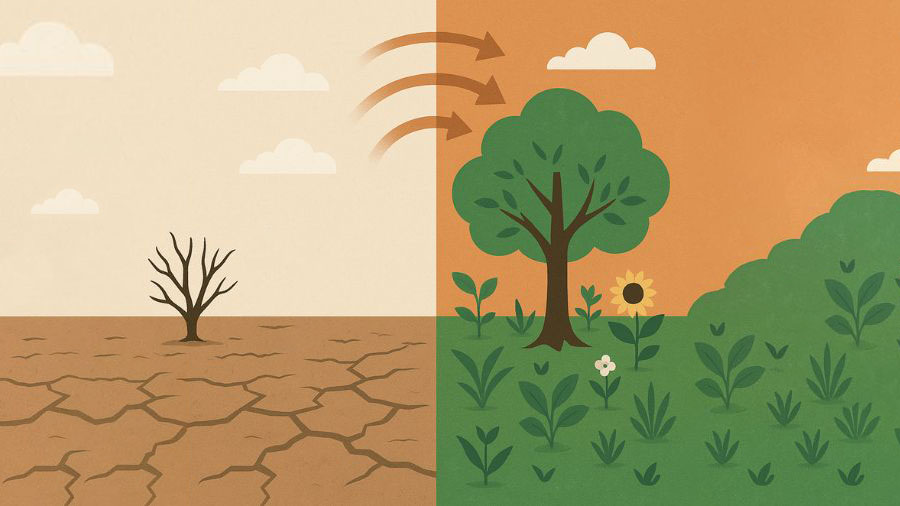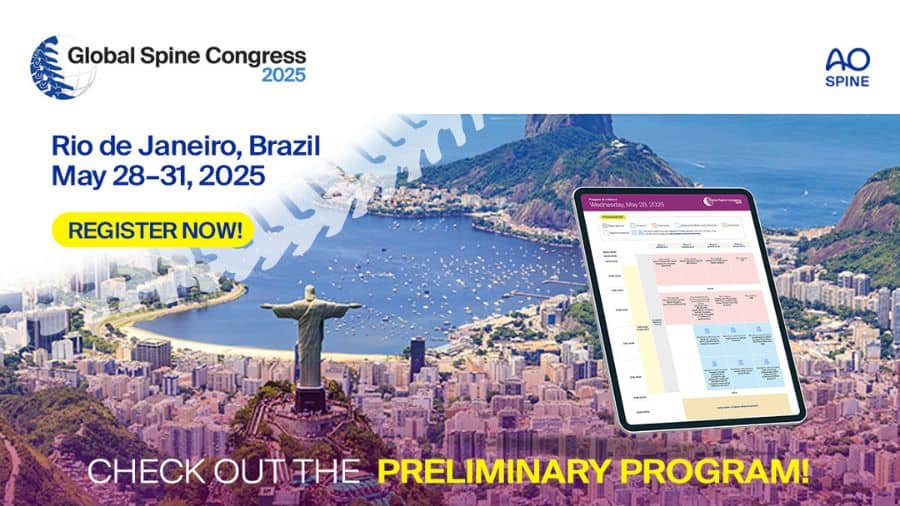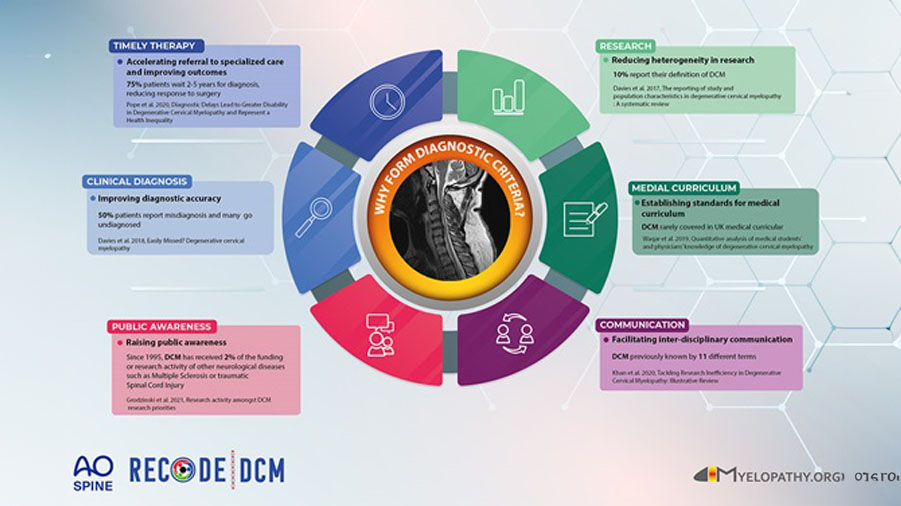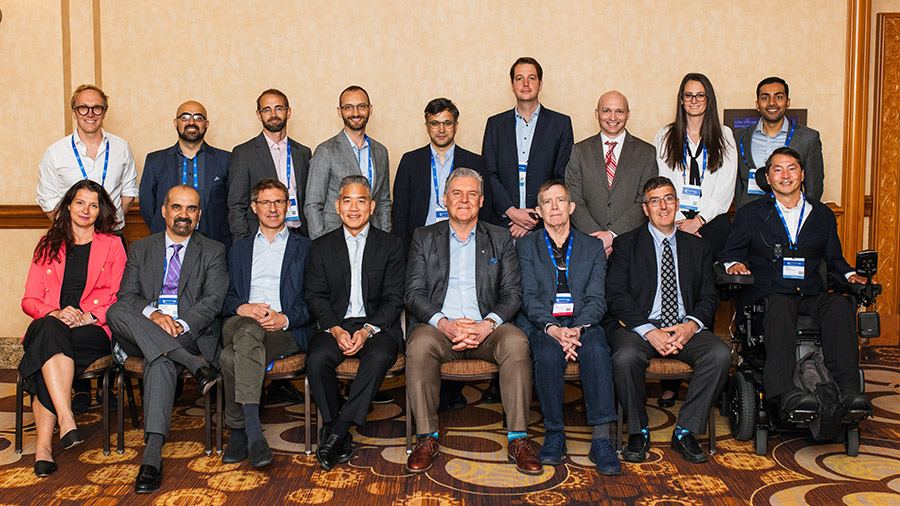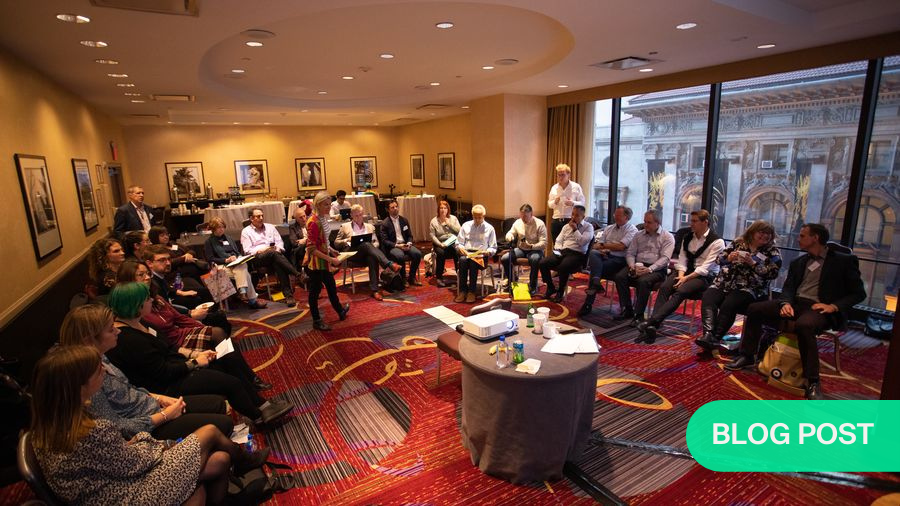AO Spine KF SCI launches RECODE 2.0 to help end disability in DCM
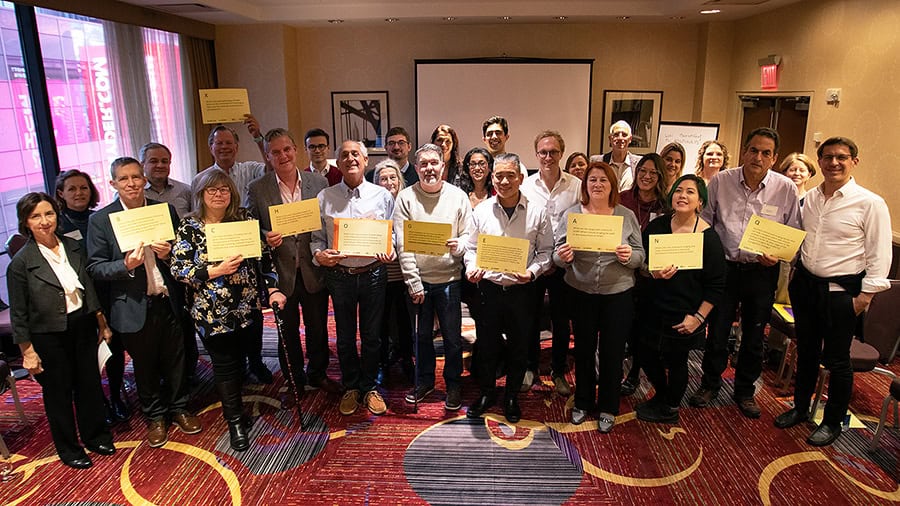
The highly successful international research initiative AO Spine RECODE-DCM has been renewed for a second instalment. RECODE-DCM 2.0 will explore in detail some of the research priorities identified by its predecessor to boost the science and understanding around Degenerative Cervical Myelopathy. The project also aims to strengthen the global network of healthcare professionals, educators, and academics dedicated to treating, studying, and teaching about DCM.
-
Read the quick summary:
- RECODE-DCM 2.0 is a global initiative expanding research and collaboration to tackle Degenerative Cervical Myelopathy (DCM).
- Sustained, collaborative innovation is needed to improve DCM diagnosis, treatment, and awareness across healthcare systems.
- The initiative invites interested parties to join one of the eight projects, to contribute to research or education strategies, and help build a global DCM-focused community.
Initially launched in 2019, the aim of RECODE-DCM (Research Objectives and Common Data Elements for Degenerative Cervical Myelopathy) was to invigorate clinical research into Degenerative Cervical Myelopathy (DCM), as well as to foster awareness and understanding of the condition, especially in the medical community.
Having brought together more than 500 clinicians, researchers, and other experts and leaders from 17 healthcare disciplines and 68 different countries, the initiative’s first instalment was successful in achieving its principal objectives: defining the top research priorities for DCM, setting a single unifying term and definition for the condition, and making available a minimum data set to use in research.
Redoubling the effort
Slated to run for the next 3 years until 2028, RECODE-DCM 2.0 will build on these achievements in a bigger and more ambitious continuation of the original project. The initiative consists of a range of collaborative research projects designed to tackle key questions related to DCM. At the same time, it will continue building an international network of stakeholders focused on strengthening innovation and knowledge translation around the condition.
“With RECODE-DCM, we were able to show that we can catalyze progress for DCM by building a global network united around a common goal we can grow more effective research and education capacity,” says Benjamin Davies, co-principal investigator for the initiative and an associate member of the AO Spine Knowledge Forum Spinal Cord Injury (SCI). “However, while the knowledge base for DCM has improved, faster and more sustained progress is sorely needed. RECODE-DCM 2.0 will therefore extend and supersize its original philosophy.”
This philosophy speaks to Transformative Innovation Policy, a shift away from driving singular or targeted discoveries, towards fostering sustained innovation by creating a fertile eco-system. Central to this approach are efforts to reduce barriers to participation, to increase the diversity of voices—particularly those historically underrepresented—but also to build a critical mass of shared knowledge, infrastructure, and capacity.
“We want to be in a position where discoveries are constantly iterated and adapted in DCM - not reliant on individual projects that take enormous resource to gear up and then just wind down. No more feast or famine. We hope RECODE2.0 can contribute to this.”
RECODE-DCM 2 takes on eight new consensus-based challenges, focusing on either directly addressing research priorities—such as Diagnostic Criteria—or laying the groundwork for future progress, like the development of an Educational Strategy.
Benjamin Davies, emphasizes the importance of breaking down professional silos and working together: “We need to think differently and work better together to create the necessary conditions for impactful change.”
An avoidable disease
DCM—sometimes referred to as a spinal cord injury (SCI) in slow motion—is a degenerative condition of the cervical spine, in which arthritic changes of the vertebrae in the neck region progressively compress and damage the spinal cord. It causes pain, disability, paralysis, and severely affects patients’ quality of life.
It is estimated that around two percent of adults around the world are affected by DCM, but that less than ten per cent of patients receive a correct diagnosis. Of those patients who are diagnosed and receive surgery, only around one in twenty will make a full recovery today. Meanwhile, almost half will be left with permanent dependencies, while over a third will be permanently unable to return to work. The resulting financial burden on healthcare systems, as well as the wider economy, is considerable.
Timely diagnosis and access to surgical treatment can prevent this.
Refining the research
RECODE-DCM 2.0 has been designed to pick up where its predecessor left off. It will consist of a set of ambitious projects called ACTs (Accelerating Creation and Translation). Each of these projects will be dedicated to a key research priority, which it will either target directly or address fundamental barriers to answering it.
So far, eight ACTs have been drawn up. They will be led by an early career physician in co-operation with a member from the Knowledge Forum SCI who will retain overall responsibility. In addition, each ACT will have a leadership committee to ensure global and diverse representation.
For example some ACTs are being tasked with creating evidence-based diagnostic criteria, drawing up standardized imaging guidelines or developing enhanced recovery after surgery (ERAS) guidelines, others will formulate an educational strategy to improve DCM awareness among medical professionals or curate a series of clinical questions frequently encountered in DCM care. All ACTs are open to anyone who is interested in contributing.
As a result of RECODE-DCM, we now have multi-disciplinary international teams addressing major clinical and research questions that impact DCM, adds Aditya Vedantam: “We expect that this next phase of the project will increase awareness and enhance clinical decision-making with the overall effect of improving the lives of people with DCM.”
Fostering global collaboration
Apart from its scientific achievements, the first instalment of RECODE-DCM created a worldwide network of motivated stakeholders from diverse backgrounds with an interest and an ability to help transfer knowledge on DCM into clinical practice—something that had not existed before.
“DCM is a lifelong condition that requires multidisciplinary management,” says the project’s co-lead Ben Davies. “But so far, there has been no organization or community considering the entire disease. If we want to enable faster and sustained progress in DCM and improve patient outcomes, a dedicated, global and diverse research community is absolutely essential.”
RECODE-DCM 2.0 hopes to extend this. Could you be part of this challenge?
Should you require further details on these projects, kindly reach out to the project manager of KF SCI, Marije de Jong.
Myelopathy.org is a non-profit organization founded to raise awareness of degenerative cervical myelopathy and support patients, carers, and professionals who live and deal with it. It is the first global scientific and clinical charity dedicated to positively transforming patient outcomes in DCM and works closely with AO Spine to achieve their mission.
You might also be interested in...
AO Spine KF symposia at the GSC
AO Spine Knowledge Forums will moderate multiple symposia and share their knowledge at the GSC.
AO Spine RECODE-DCM
Watch the latest videos and find all the details of the study and its outcomes.
AO Spine Knowledge Forum SCI
The KF Spinal Cord Injury builds on worldwide research partnerships for global impact.
Innovation in spine surgery
Ben Davies considers the role of diversity in new approaches through the example of DCM.


